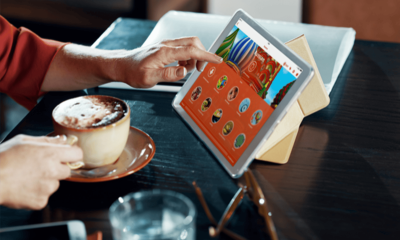Investing
U.S. rice exports to Haiti have unhealthy levels of arsenic, study finds

© Reuters. FILE PHOTO: A local sells rice and grains at a street market in Port-au-Prince, Haiti, February 19, 2019. REUTERS/Ivan Alvarado/File Photo
2/3
PORT-AU-PRINCE (Reuters) – U.S. rice exports to Haiti, which account for the bulk of supplies of the country’s key food staple, contain unhealthy levels of arsenic and cadmium, heavy metals that can increase risks of cancer and heart disease, according to a recent study by the University of Michigan.
Haiti is among the United States’ top buyers of rice, alongside Mexico and Japan, and cheap imports are more affordable than local options in the Caribbean nation, the poorest state in the Western Hemisphere.
According to the study, average arsenic and cadmium concentrations were nearly twice as high in imported rice compared to Haitian-grown product, with some imported samples exceeding international limits.
Nearly all imported rice samples exceeded the U.S. Food and Drug Administration’s recommendation for children’s consumption. The study did not evaluate levels of toxins in other importing countries.
The U.S. FDA and State Department did not immediately respond to a request for comment.
The study, which attributed the dominance of imported rice to lower import tariffs and long-term contracts signed during political turmoil in the late 1980s and 1990s, said Haiti imports nearly 90% of its rice, almost exclusively from the U.S.
Former U.S. President Bill Clinton, who helped push subsidies of U.S. rice to Haiti, later called the move a “mistake” saying it had battered local production capacity.
The study also pointed to comparatively loose U.S. limits on concentrations arsenic and cadmium, which can leach from both human and naturally occurring sources to contaminate food and water. Rice is especially prone to absorb these metals.
The report cited Louisiana, Texas and Arkansas as top exporting states.
When researchers ran the study in 2020, they found that Haitians on average consumed 85 kg (187 lb) of rice per year, compared to 12 kg in the U.S., putting especially young Haitians at far greater risk of developing related health complications.
“The flooding of U.S. rice into Haiti is not only economically violent for Haitian peyizan who struggle to sell their local product, but also violent toward the long-term health of Haitian consumers,” the report said.
“By maintaining a system dependent almost exclusively on U.S. rice, Haiti is importing a substantial amount of risk.”
The report called for an ethical investigation into U.S. rice exporters, measures to strengthen Haiti’s agricultural sector and flagged a “dire need” to boost the country’s food safety regulations.
A violent conflict between heavily armed gangs has been spreading to Haitian farmlands, further pushing up food prices. The United Nations estimates over 300,000 have fled their homes and that some 40% of the population is going hungry.
Read the full article here

-

 Side Hustles5 days ago
Side Hustles5 days agoExpand Your Global Reach with Access to More Than 150 Languages for Life
-

 Side Hustles6 days ago
Side Hustles6 days agoKickstart Your Year With These Entrepreneurial Health Checkups
-

 Side Hustles4 days ago
Side Hustles4 days agoKFC Announces Saucy, a Chicken Tenders-Focused Spinoff
-

 Side Hustles5 days ago
Side Hustles5 days agoThis AI is the Key to Unlocking Explosive Sales Growth in 2025
-

 Investing4 days ago
Investing4 days agoPalantir, Anduril join forces with tech groups to bid for Pentagon contracts, FT reports By Reuters
-

 Side Hustles3 days ago
Side Hustles3 days ago4 Ways Content Can Make or Break the Customer Experience
-

 Passive Income6 days ago
Passive Income6 days agoHow to Motivate, Inspire and Energize Your Employees
-

 Make Money6 days ago
Make Money6 days agoBrace for Impact: 5 Potential Stock Market Crash Triggers in 2025


















